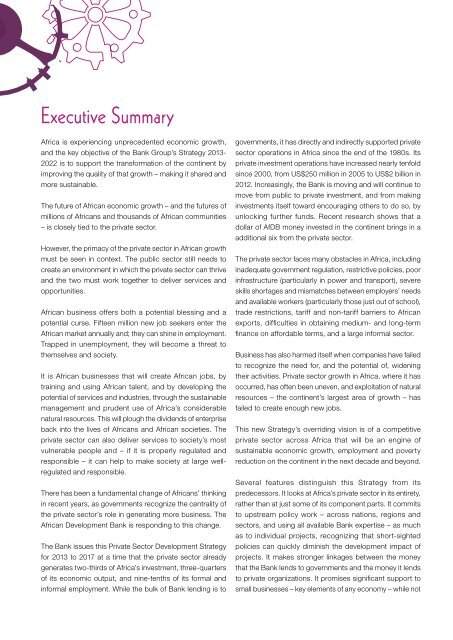2013-2017_-_Private_Sector_Development_Strategy
2013-2017_-_Private_Sector_Development_Strategy
2013-2017_-_Private_Sector_Development_Strategy
Create successful ePaper yourself
Turn your PDF publications into a flip-book with our unique Google optimized e-Paper software.
Executive Summary<br />
Africa is experiencing unprecedented economic growth,<br />
and the key objective of the Bank Group’s <strong>Strategy</strong> <strong>2013</strong>-<br />
2022 is to support the transformation of the continent by<br />
improving the quality of that growth – making it shared and<br />
more sustainable.<br />
The future of African economic growth – and the futures of<br />
millions of Africans and thousands of African communities<br />
– is closely tied to the private sector.<br />
However, the primacy of the private sector in African growth<br />
must be seen in context. The public sector still needs to<br />
create an environment in which the private sector can thrive<br />
and the two must work together to deliver services and<br />
opportunities.<br />
African business offers both a potential blessing and a<br />
potential curse. Fifteen million new job seekers enter the<br />
African market annually and; they can shine in employment.<br />
Trapped in unemployment, they will become a threat to<br />
themselves and society.<br />
It is African businesses that will create African jobs, by<br />
training and using African talent, and by developing the<br />
potential of services and industries, through the sustainable<br />
management and prudent use of Africa’s considerable<br />
natural resources. This will plough the dividends of enterprise<br />
back into the lives of Africans and African societies. The<br />
private sector can also deliver services to society’s most<br />
vulnerable people and – if it is properly regulated and<br />
responsible – it can help to make society at large wellregulated<br />
and responsible.<br />
There has been a fundamental change of Africans’ thinking<br />
in recent years, as governments recognize the centrality of<br />
the private sector’s role in generating more business. The<br />
African <strong>Development</strong> Bank is responding to this change.<br />
The Bank issues this <strong>Private</strong> <strong>Sector</strong> <strong>Development</strong> <strong>Strategy</strong><br />
for <strong>2013</strong> to <strong>2017</strong> at a time that the private sector already<br />
generates two-thirds of Africa’s investment, three-quarters<br />
of its economic output, and nine-tenths of its formal and<br />
informal employment. While the bulk of Bank lending is to<br />
governments, it has directly and indirectly supported private<br />
sector operations in Africa since the end of the 1980s. Its<br />
private investment operations have increased nearly tenfold<br />
since 2000, from US$250 million in 2005 to US$2 billion in<br />
2012. Increasingly, the Bank is moving and will continue to<br />
move from public to private investment, and from making<br />
investments itself toward encouraging others to do so, by<br />
unlocking further funds. Recent research shows that a<br />
dollar of AfDB money invested in the continent brings in a<br />
additional six from the private sector.<br />
The private sector faces many obstacles in Africa, including<br />
inadequate government regulation, restrictive policies, poor<br />
infrastructure (particularly in power and transport), severe<br />
skills shortages and mismatches between employers’ needs<br />
and available workers (particularly those just out of school),<br />
trade restrictions, tariff and non-tariff barriers to African<br />
exports, difficulties in obtaining medium- and long-term<br />
finance on affordable terms, and a large informal sector.<br />
Business has also harmed itself when companies have failed<br />
to recognize the need for, and the potential of, widening<br />
their activities. <strong>Private</strong> sector growth in Africa, where it has<br />
occurred, has often been uneven, and exploitation of natural<br />
resources – the continent’s largest area of growth – has<br />
failed to create enough new jobs.<br />
This new <strong>Strategy</strong>’s overriding vision is of a competitive<br />
private sector across Africa that will be an engine of<br />
sustainable economic growth, employment and poverty<br />
reduction on the continent in the next decade and beyond.<br />
Several features distinguish this <strong>Strategy</strong> from its<br />
predecessors. It looks at Africa’s private sector in its entirety,<br />
rather than at just some of its component parts. It commits<br />
to upstream policy work – across nations, regions and<br />
sectors, and using all available Bank expertise – as much<br />
as to individual projects, recognizing that short-sighted<br />
policies can quickly diminish the development impact of<br />
projects. It makes stronger linkages between the money<br />
that the Bank lends to governments and the money it lends<br />
to private organizations. It promises significant support to<br />
small businesses – key elements of any economy – while not


